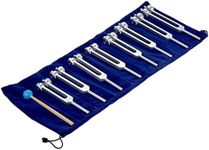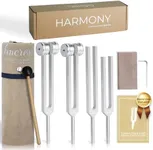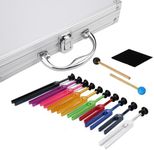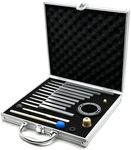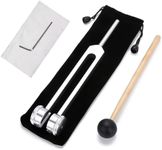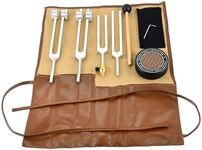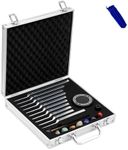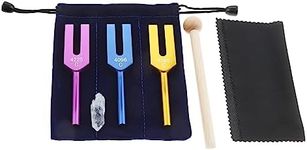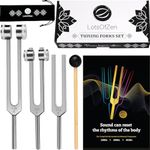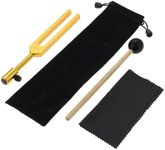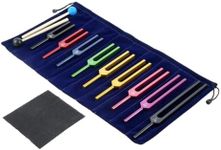Buying Guide for the Best Tuning Forks For Healing
When choosing tuning forks for healing, it's important to understand the different aspects that can affect their performance and suitability for your needs. Tuning forks are used in sound therapy to promote relaxation, reduce stress, and improve overall well-being. The right tuning fork can make a significant difference in your healing practice, so it's essential to consider various specifications to ensure you select the best one for you.FrequencyFrequency refers to the pitch of the sound produced by the tuning fork, measured in Hertz (Hz). Different frequencies are believed to have different healing properties. Lower frequencies (e.g., 128 Hz) are often used for grounding and relaxation, while higher frequencies (e.g., 4096 Hz) are used for more subtle energy work and clearing. To choose the right frequency, consider what you are aiming to achieve with your healing practice. If you are looking to promote deep relaxation and grounding, opt for lower frequencies. For more delicate energy work, higher frequencies may be more appropriate.
MaterialTuning forks are typically made from aluminum or steel. Aluminum forks are lighter and produce a softer, more mellow sound, making them suitable for gentle healing practices. Steel forks, on the other hand, are heavier and produce a sharper, more penetrating sound, which can be beneficial for more intense therapeutic work. Consider the type of healing you plan to do and choose the material that aligns with your needs. If you prefer a softer, more soothing sound, aluminum may be the better choice. For a more powerful and direct sound, steel might be more appropriate.
Weighted vs. UnweightedWeighted tuning forks have weights attached to the ends of the prongs, which allows them to vibrate longer and produce a stronger vibration that can be felt when placed on the body. Unweighted tuning forks do not have these weights and produce a sound that is more easily heard but less felt. Weighted forks are often used for physical healing and pain relief, as the vibrations can be applied directly to the body. Unweighted forks are typically used for sound healing and energy work, where the focus is on the auditory experience. Choose weighted forks if you want to focus on physical healing and unweighted forks if your primary goal is sound therapy.
Set vs. Individual ForksTuning forks can be purchased individually or as part of a set. Sets often include forks of different frequencies, allowing for a more versatile healing practice. Individual forks are a good option if you are just starting out or if you have a specific frequency in mind. If you are new to tuning forks, starting with a set can provide you with a range of options to explore and find what works best for you. If you already have experience and know which frequencies you prefer, purchasing individual forks may be more cost-effective and tailored to your needs.
Durability and QualityThe durability and quality of a tuning fork can affect its performance and longevity. High-quality tuning forks are typically more precisely tuned and made from better materials, ensuring a consistent and reliable sound. Durability is especially important if you plan to use the forks frequently or in a professional setting. Look for tuning forks from reputable manufacturers and read reviews to ensure you are getting a product that will last and perform well. Investing in a high-quality tuning fork can enhance your healing practice and provide better results over time.
